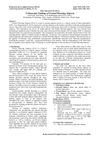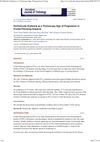Frontal Fibrosing Alopecia: A Case Report of a 66-Year-Old Caucasian Woman
July 2015
in “
Journal of the Dermatology Nurses’ Association
”

TLDR A 66-year-old woman experienced hair loss due to Frontal Fibrosing Alopecia, a condition with no consistently effective treatment, but it usually stabilizes over time. More research is needed for better understanding and treatment options.
The document is a case report from 2015 about a 66-year-old Caucasian woman who presented with Frontal Fibrosing Alopecia (FFA), a form of hair loss often seen in postmenopausal Caucasian women. The patient had been experiencing hair loss on her frontal scalp, eyebrows, arms, and legs for several years. FFA is considered a variant of lichen planopilaris (LPP), a perifollicular inflammatory disease, and is characterized by alopecia along the frontal hairline that extends posteriorly with scarring. The histology of FFA is the same as LPP, with early stages showing a lichenoid interface inflammation at the hair follicles and within the perifollicular dermis. Unfortunately, there is no consistently effective treatment for FFA, with corticosteroids often used as first-line therapy. Other medications may be tried, but results are inconsistent. The disease usually stabilizes over time, regardless of treatment. The report suggests that more research is needed to determine the etiology and treatment for FFA, and to investigate if bioidentical hormone replacement is a factor in progression or a potential therapeutic treatment option.





